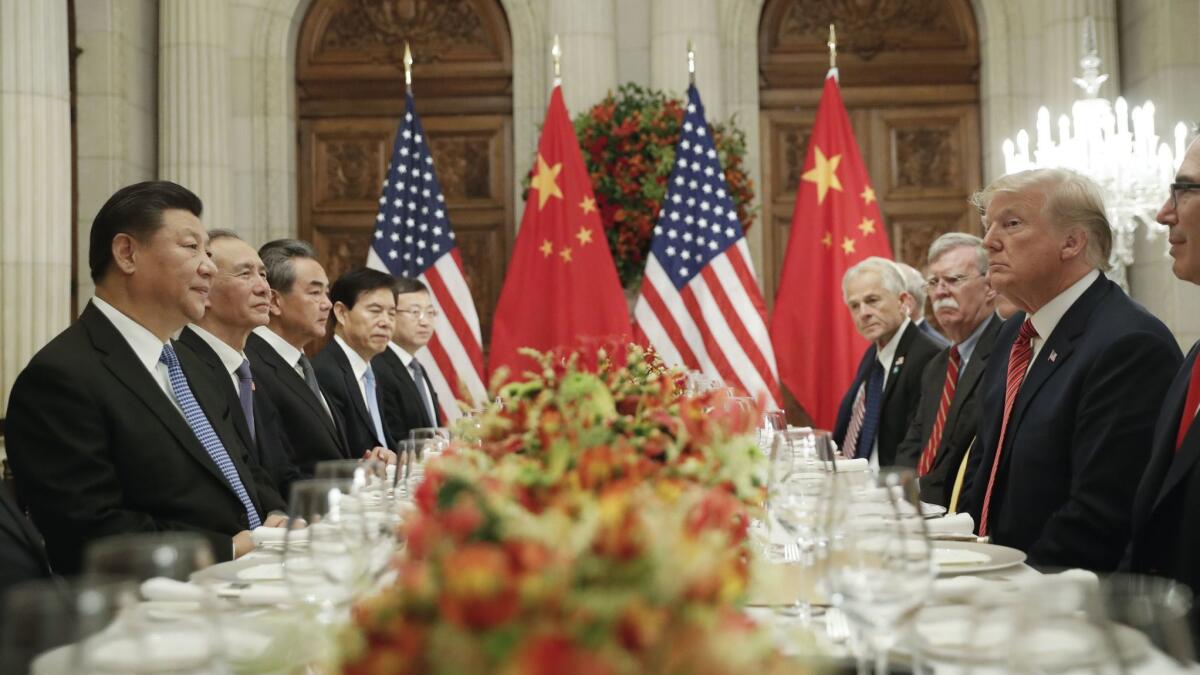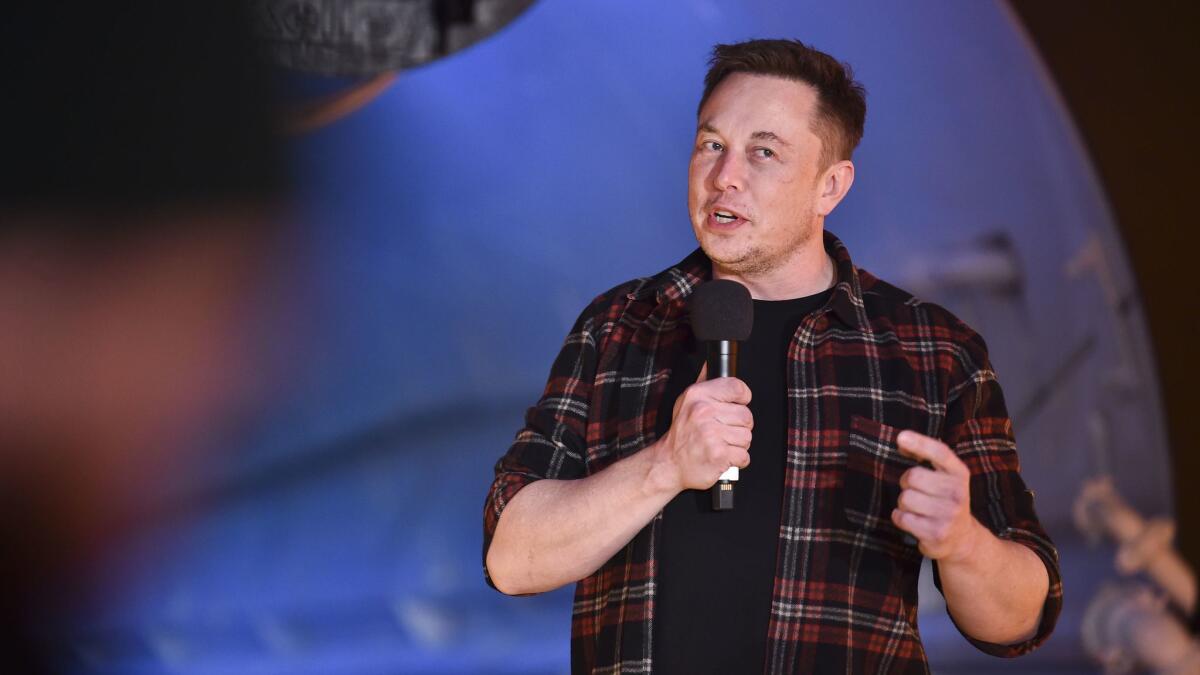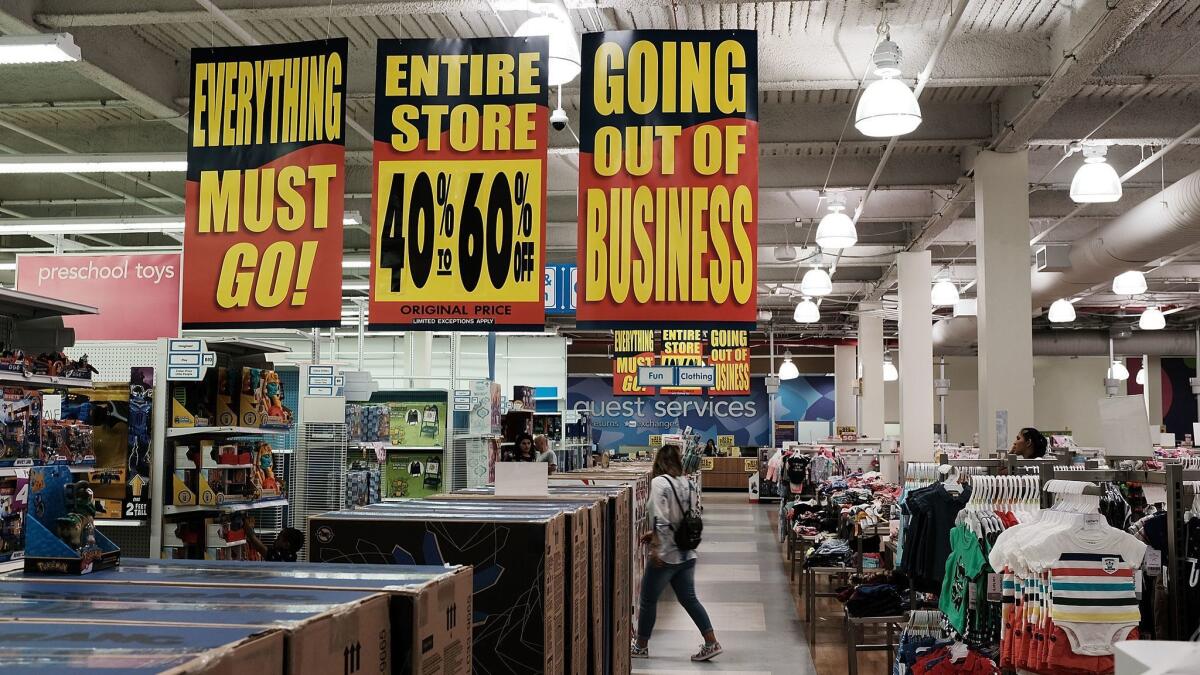In 2018, a trade war broke out, Wall Street’s party ended and peacocks met their match

- Share via
Infinity trade war
It started with imported solar panels, extended to steel and aluminum made by allies and later reached thousands of industrial and consumer goods from China. President Trump waged a trade war in 2018, proclaiming himself a “tariff man.” By year’s end, the global conflict was far from over. Trump successfully negotiated a new trade pact with Mexico and Canada, but made little headway with the Chinese. As in any war, there were casualties, including billions of dollars of losses suffered by farmers shut out of China and a decision by Harley Davidson to shift some production overseas to avoid retaliatory tariffs.
Wall Street loses it
After a decadelong bull run, the year was marked by the return of extreme market volatility. Investors weathered two 1,000-point drops in the Dow in a single week in February, only to see shares later rise and then fall again. Facebook, Google and other Silicon Valley giants were hit by data breaches and other missteps, but faced broader headwinds like all stocks: the trade war, rising interest rates and fear the economic expansion was waning. Heading into Christmas, the market recorded its worst week in seven years, edging into bear territory — then sprang back with its best day since 2009.

Elon Musk, master of chaos
A minute into every launch, a SpaceX rocket reaches “Max Q” — the maximum point of aerodynamic pressure. For Elon Musk, CEO of SpaceX and Tesla, such a state seems permanent. Ramping up production of Tesla’s popular Model 3 electric sedan, Musk said he encountered “production hell.” That was followed by delivery hell, where some customers couldn’t get their cars, and service hell, when repairs took weeks. Musk tweeted he had “funding secured” to take Tesla private — an unsupported claim that cost him $20 million and his chairmanship. At year’s end, SpaceX faced a NASA safety probe, after the Rocket Man burned out his fuse smoking a joint on a comedy podcast.
Losing friends
Facebook entered 2018 on the defensive, fending off questions about dissemination of propaganda and lies on the social media platform during the 2016 election. From there, scandals mounted. It became clear that user data wound up in the hands of Cambridge Analytica, a data company with ties to President Trump's campaign. A security breach exposed as many as 50 million users. The company's role spreading ethnic hatred in Myanmar sparked outrage. Its attempts at damage control only made critics madder. Whether CEO Mark Zuckerberg can — or wants to — alter the company's course is a question for 2019.
Home prices cool it
For six years, California home prices climbed, warming the hearts of homeowners rattled by the financial crisis and pushing the American dream further out of reach for others. Now the market is cooling. Sales fell 12% in November. At $522,750, the Southern California median price has eased off a recent high but is still more than twice its 2009 nadir, and experts don’t expect another crash. But buyers also don’t see any reason to rush in. Why should they, when Los Angeles County sellers cut prices on 22.2% of November listings? Even rents are slowing, albeit remaining at a stratospheric level: the L.A. median for a vacant apartment hovers just below $2,500.
A mogul’s downfall
He was a legendary figure in TV who helped rebuild CBS into a ratings juggernaut behind such hits as “CSI: Crime Scene Investigation” and “Everybody Loves Raymond.” But Les Moonves’ career came to a dramatic end in 2018 when he was ousted as CEO following allegations of inappropriate behavior toward multiple women in the 1990s. His exit marked a remarkable downfall for one of Hollywood’s most respected executives and the highest-profile media figure to fall in the wake of the #MeToo movement. It was also a victory for controlling shareholder Shari Redstone, who clashed with Moonves and other board members over a possible merger with Viacom.
Amazon’s hunger games
It began with a tantalizing prize: 50,000 high-paying jobs. Amazon once again was upending business norms, staging an open competition for its HQ2 second-headquarters site. Civic leaders desperate to claim tech-mecca status submitted 238 proposals, offering billions in tax waivers, investments — even dedicated Amazon train cars. Critics decried gutting tax bases to pad the pockets of CEO Jeff Bezos, the world’s richest man. In the end, the choices of New York City and Northern Virginia were hardly surprising. Given its requirements — such as access to an international airport and rail transit — Amazon never seemed likely to stray from the coasts.
A year of blockbusters
Hollywood’s appetite for dealmaking kept growing, and media giants got even bigger. A fear of tech giants like Netflix helped fuel blockbuster deals that reshaped the industry. Rupert Murdoch’s surprise decision to sell much of the media empire he spent decades building touched off a bidding war between Walt Disney Co. and Comcast Corp. Disney prevailed, scooping up the Fox movie studio, cable channels and sports networks for $71 billion. Comcast plunked down nearly $40 billion for British satellite TV service Sky. And an even bigger deal was cleared when a federal judge approved AT&T’s $85.4 billion purchase of Time Warner Inc.

Cancel the retail apocalypse
Retailers closing stores, filing for bankruptcy protection or liquidating continued at a brisk pace, claiming well-known merchants such as Sears Holdings, David’s Bridal and Toys “R” Us. But the idea of a retail apocalypse has been oversold, some experts contend. Moody’s Investor Service turned upbeat on the sector in October, noting that a strong U.S. economy, e-commerce investments and cost cutting had begun to bear fruit for merchants. Research firm IHL Group projected that North American retailers will have opened nearly 4,000 more stores than they closed by the end of 2018.
Bitcoin’s bubble bursts
If 2017 was the year the bitcoin craze minted millionaires, 2018 was the year investors faced a collective “I told you so!” One of the greatest speculative manias of all time, the seminal cryptocurrency reached a high of $19,783 last December, but had lost about 80% of its value by the end of 2018. Investors who came late to the craze with their cashed out 401(k)s or ill-considered second mortgages suffered the most. And even as the bubble was deflating, another craze in “initial coin offerings” of newer cryptocurrencies raised billions of dollars from investors before drawing a federal crackdown.
Drawing the line at peacocks
Several U.S. airlines imposed tough restrictions on what kind of service or emotional-support animals passengers can bring on planes, following a surge of fliers with dogs, turkeys and other creatures. Federal law allows people with mental-health disabilities to fly with an emotional-support animal free if it alleviates their condition. Carriers contend that fliers were using phony credentials to pass off pets and avoid transport fees. Most carriers allow only dogs, cats and miniature horses as service animals, which assist travelers with physical disabilities. (Mini horses got a carve-out in the Americans with Disabilities Act, thanks to a 2010 court ruling.)
Inside the business of entertainment
The Wide Shot brings you news, analysis and insights on everything from streaming wars to production — and what it all means for the future.
You may occasionally receive promotional content from the Los Angeles Times.







